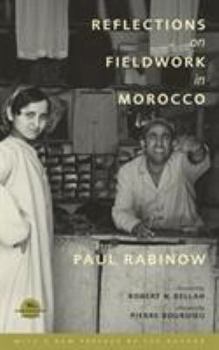Reflections on Fieldwork in Morocco
Select Format
Select Condition 
Book Overview
In this landmark study, now celebrating thirty years in print, Paul Rabinow takes as his focus the fieldwork that anthropologists do. How valid is the process? To what extent do the cultural data become artifacts of the interaction between anthropologist and informants? Having first published a more standard ethnographic study about Morocco, Rabinow here describes a series of encounters with his informants in that study, from a French innkeeper clinging to the vestiges of a colonial past, to the rural descendants of a seventeenth-century saint. In a new preface Rabinow considers the thirty-year life of this remarkable book and his own distinguished career.
Format:Paperback
Language:English
ISBN:0520251776
ISBN13:9780520251779
Release Date:May 2007
Publisher:University of California Press
Length:208 Pages
Weight:0.60 lbs.
Dimensions:0.5" x 5.0" x 8.1"
Customer Reviews
3 ratings
False Starts and New Departures
Published by Thriftbooks.com User , 17 years ago
For anthropologists, doing fieldwork is a kind of rite of passage, a process of initiation into the profession as well as a marker which separates anthropologists from other social scientists who "don't do fieldwork". But at the time when Paul Rabinow wrote his Reflections, there were surprisingly little books attempting to define what fieldwork is and giving aspiring anthropologists some tools and lessons on how to pursue their field research successfully. Reflections on Fieldwork in Morocco thus soon became required reading in anthropology classes, and many graduate students were encouraged to hold a research diary in which they would record similar introspective thoughts in parallel to their scholarly work. But Rabinow's book is not a fieldwork manual and it will provide little guidance to young researchers going on the field. It is by no means a "how to" book. If anything, it records false starts, dead ends and failures, where a more standard scholarly manual would give an impression of fulfillment and completion. The anthropologist's research study on Symbolic Domination: Cultural Form and Historical Change in Morocco, which constitutes the shadow volume to this short essay, could have turned out completely differently and its completion owes much to chance encounters, the politics of getting access to the field, and the choice of informants who provided the author with their insider's knowledge. Doing fieldwork, it turns out, is not very different from simply hanging around. "After all, now that I was in the field, anything was fieldwork", remarks Rabinow. Like those Dutch masters who reproduced in their paintings a reflexion of the painter in action, the anthropologist includes himself in the picture and tries to conform to a projected image. Spending his days in the old city of Sefou "fulfilled all of my images of myself as anthropologist sitting in the heart of a thousand-year-old walled city, with my turbaned friends, notebook on my lap, drinking tea and being the participant observer." But the anthropologist is not the only one to strike a pose. The observed Moroccans also act consciously so as to convey a certain image of their society to the observer, and their behavior is affected by his presence among them. One is surprised to find out that many contacts of Rabinow had previously worked with other anthropologists. Informants too are engaged in their own fieldwork, an activity for which they are more or less talented, and they expect a kind of retribution for the service they provide. This compensation often takes the form of monetary payment for work sessions, as the author would normally pay for language tuition (the two often go together), but some informants choose other forms of retribution, as the author obliged to give taxi rides to a vast number of solicitors soon finds out. There is a lovely scene in which a seemingly dying old lady is driven to the hospital, only to ask to be dropped to the nearest market, where she has
How much objectivity could you keep while studying a people?
Published by Thriftbooks.com User , 25 years ago
First off, this is not a book about the Moroccan people. It is a book about the ethnographer's experience with a community of Moroccan people. I assume that, somewhere out there, is a university press publication of his actual findings gathering dust on a shelf. Instead, this book is about some of the more uncomfortable aspects of anthropology and the destroying of illusions.Questions of finding the outsider's insider (someone enough on the fringes to be willing to take you under their wing, but not so much that they don't have a good in-road into their own culture), of the purity of research (did you have to pay these people before they'd bother to talk to you? Were they expecting payment based on relations with other enthnographers?), and how much one can really understand a culture just by sitting a watching it (as opposed to participating, which threatens objectivity) are the issues Rabinow faced, and what he wrote about."Reflections on Fieldwork in Morocco" is just that, memoirs on the process of the research itself, not Rabinow's findings. There are interesting comments on Rabinow's interactions with his insiders, but rarely the sort that could go into a standard academic tome. This answer to the delima of objectivity, splitting one's experiences into an official report and a journal of sorts, is one I'd like to see more of.
Reflecting on reflection
Published by Thriftbooks.com User , 25 years ago
Not only is this book elegantly written, but it also is a must for those seriously considering entering the everchanging field of anthropology. It is meant to be a reflection on Dr. Rabinow's experiences, which can prepare others for what they may encounter in their own "fields."






